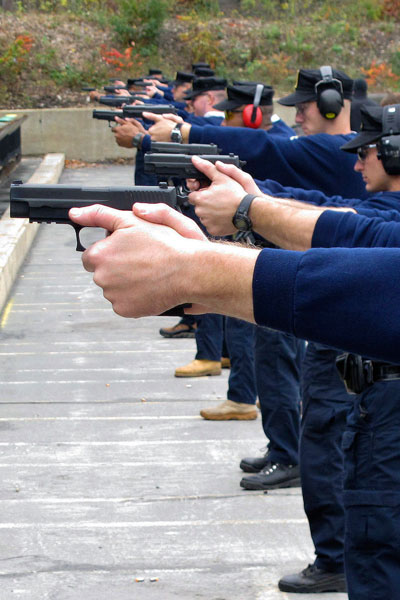Police Training
- Police Training Defensive Tactics.This course is designed to acquaint the officer with defensive tactics other than deadly force.The course includes threat assessment, use of force theory, employ hand control, handcuffing (three methods), unhandcuffing, officer break falls, ground fighting, retention and disarming.
- Handcuffing – Tactical handcuffing, understanding when and how to do handcuffing. Use of handcuffs to control suspects.Address liability issues normally associated with handcuffs.
- Self defense by Pressure Points-Use of the nerve center of the body to control low levels of resistance.Basic control techniques using pressure points.
- Defensive Counter Measures.Teach officers how to protect themselves from an attack and how to counter attack higher levels of resistance.Use of joint manipulations to control suspects.
- Chemical Spray (OC Spray) The proper use of OC spray along with follow up care, How to select a product that’s good for your department,
- Batons, Proper use of Batons, (Straight, Expandable, PR-24) Escalation of force without excessive force. This course will prepare officers to safely and effectively utilize the ASP Baton as an innovative law enforcement tool.Items covered include; The “Confrontational Continuum,” assailant target areas, proper baton handling positions and strikes, assaultive behavior clues and documenting the use of force.
- Spontaneous Edge Weapons.Basic techniques to check pass and disengage when attacked by an edged weapon.How to control a suspect with an edged weapon,
- Basic Firearms training to include safe handling, proper use, and target acquisition.
- Police Advanced Marksmen (Sniper/Sharp Shooter), Principles of Advanced Rifle Sharp Shooting, Selection of all Equipment, Weapons, Optical and Communication. Selection Criteria for Personnel and Techniques of observation, Target Approach, and Selection of Sharp Shooting Positions.
- Hostage Barricade Situations – Hostage negotiation techniques, Dynamic Interaction instruction for proper communication between hostage takers and hostage Rescue Team Representative.Close Quarter Battle Shooting Technique for hand gun, shotgun, and submachine gun in hostage barricade situations.Proper selection of equipment and Weapons for same.Explosive Entry Techniques for hostage barricade situation and proper use of Stun Grenades, and Pyrotechnics to include riot agents.
- Basic Patrol Procedures-vehicle stops suspect approaches, High risk stops. Cover and Contact,
- Tactical Entry.-SWAT school teaching coordinated entries and the proper use of the appropriate weapons,
- Vehicle Operations Course – Teaching officers how to control a vehicle during accident avoidance, high speed use and defensive driving.
- Basic and advanced accident investigations Teaches the basic, course in accident reconstruction.Advanced course teaches speed calculations.
- Drug recognition and interdiction classes – basics of narcotics investigations and undercover operations.
- Arrest, Search & Seizure – To include probable cause, detention, and arrest; exceptions to search warrant requirements (Texas Law), search warrant principles and preparation including documentation and components of a probable cause affidavit; suppression hearings, and civil liability.
- Police Training – Child Abuse.An overview of the nature cause and effects of child abuse; authority and responsibility of the law enforcement officer, categories of child abuse and neglect; components and characteristics of child abuse; investigative strategies and special investigative issues.
- Police Training – Crime Scene Search.This course is designed to teach the basic precepts of latent print processing.Both physical and chemical processing methods are covered. Laboratory exercises allow the officer to actually accomplish a variety of processing methods.
- Evidence, Property and Narcotics Procedures.This course is designed to acquaint the property/narcotics custodian with the understanding of property control procedures and provide an understanding of requirements and documentation to control narcotics used in undercover operations.
- Field Training Officer Program.Various techniques and theories regarding the human relation aspects of dealing with people, their performance and problems.Topics may include: basic supervision, leadership, time management, first line supervision, management by objectives.
- Police instructor’s training.This course will prepare qualified officers to formulate lesson plans, conduct law enforcement courses and evaluate their instructions.Those attending should have at least five years of law enforcement experience and should be for persons who will teach certified training programs.
- Police Report Writing.Initial stages of field note taking, proper narrative form, physical elements of a properly executed report and the importance of reports in court appeals.
- Basic Police Training Course to include topics of recognition of child abuse/neglect, family violence, sexual assault, civil rights, racial sensitivity, cultural diversity and the supervisors role.
Note: L&P Global Security Training Academy is not an accredited Police Academy but offers police and security detail training courses to individual and organization wishing to enhance the level of training of their police and security personnel.

